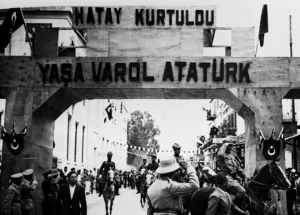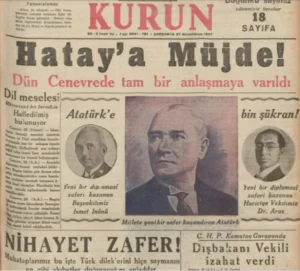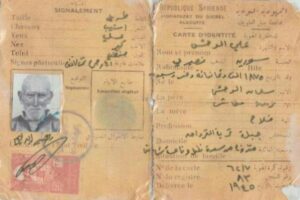The Hatay Issue, Atatürk, and Syria’s Independence
The late 1930s witnessed a critical period in the political relations between Türkiye and Syria. The Hatay issue was a milli dava (national cause) for Türkiye and part of the struggle forindependence for Syria. While France’s mandate administration over Syria and its ambitionsin Hatay increased tensions in the region, Türkiye’s determined diplomatic steps andleadership vision left a mark on this period. Atatürk hosting Syrian Prime Minister Cemil (Jamil) Mardam in Ankara was an important turning point, not only in the relations betweenthe two countries but also in regional politics.
The Road to Syria’s Independence Passes Through Ankara
The late 1930s witnessed a critical period in the political relations between Türkiye and Syria. The Hatay issue was a milli dava (national cause) for Türkiye and part of the struggle forindependence for Syria. While France’s mandate administration over Syria and its ambitionsin Hatay increased tensions in the region, Türkiye’s determined diplomatic steps andleadership vision left a mark on this period. Atatürk hosting Syrian Prime Minister Cemil (Jamil) Mardam in Ankara was an important turning point, not only in the relations betweenthe two countries but also in regional politics.
On November 30, 1937, the French army intervened in Hatay, using certain celebrations as a pretext. This was a clear message. In response, Türkiye invited Syrian Prime Minister Cemil Mardam to Ankara to discuss the matter. Prime Minister Mardam paid a two-day visit toTürkiye on December 21-22, 1937.
On his second day in Ankara, Syrian Prime Minister Cemil Mardam started with a packedschedule. In the morning, he visited the Orman Çiftliği (Forest Farm), the Gazi Terbiye Enstitüsü (Gazi Institute of Education), and the İsmet Paşa Kız Enstitüsü (İsmet Paşa Girls‘ Institute). At 13:30, he attended a luncheon held in his honor by the Minister of the Interiorand Secretary General of the Cumhuriyet Halk Partisi (Republican People’s Party), Şükrü Kaya, at the Anadolu Kulübü (Anatolian Club). Later, he met with President Mustafa Kemal Atatürk at the Karpiç Lokantası (Karpiç Restaurant).
This meeting was quite different from the formal receptions Atatürk had held with foreignguests until then. During the meeting, Atatürk clearly stated that Syria must be independent. Emphasizing that Hatay was a namus meselesi (matter of honor), he said that if necessary, thearmy would intervene to resolve the issue. Atatürk displayed a self-confident diplomacy byanalyzing the international situation well. He foresaw that developments in the EasternMediterranean would lead Western states to side with Türkiye.


Diplomat and historian Bilal Şimşir conveys the words recorded in the minutes of thismeeting as follows:
“Atatürk not only conveyed his love and greetings to Syria but also gave a comprehensivespeech. During the meeting, which lasted until midnight at the table, Atatürk spoke with greatfrankness, sometimes becoming stern and directing harsh criticisms at the French. ‘TheFrench have tied the hands and arms of the Syrians,’ he said, turning to Cemil Mardam andexclaiming, ‘Untie them, break those ties!’ Then he added: ‘I say that the Islamic world andthe Syrian nation must be completely and absolutely independent. Thinking otherwise wouldbe weakness. The French government must come to its senses.’ As for Hatay, he said, ‘This is a matter of honor for me.’”
According to another account, during the meeting, Atatürk said:
“If the French are dreaming, the outcome will turn against them. They must come to theirsenses. If they have doubts, they can test us. I swear on my honor (namusum üzerine) that I will not give up Hatay!”
With these harsh statements, Atatürk summoned French Ambassador M. Ponceau to Karpiç Restaurant and gave him a direct warning. Mustafa Kemal unequivocally emphasized that he stood alongside Syria and other Islamic nations under French occupation: “The French claimthey want to turn Syrians into men. But first, they should become men themselves!”
Sabiha Gökçen recounts an incident that occurred during this period:
“The Hatay issue was being discussed. One evening, Atatürk said to me:
‘Go upstairs, put on your uniform, take your pistol, and come back.’
I did as he said. Then we went to Karpiç. A speaker would come out and say something, andafterward, I was to step forward and say:
‘We young people want this matter to be resolved more quickly. If there is any slackness, wewill do what is necessary!’ Then Atatürk asked me to fire my pistol into the ceiling. I didexactly as he said, and the French Ambassador searched for a place to hide.”
Politician Asım Us, who passed away in 1967, wrote the following about those days:
“Syrian Prime Minister Cemil Mardam came to Ankara to hold talks about the Hatay issue. However, the French told the Syrians, ‘If you do not come to an agreement with the Turks, wewill not recognize your independence.’ If the Syrians had come to an agreement with Türkiye the previous year, their independence would have begun much earlier. The road to Syria’sindependence passes through Ankara.”
Before returning to Syria, Syrian Prime Minister Cemil Mardam made the followingstatement to journalists at Ankara Station:
“I am leaving with deep satisfaction from the warm welcome and hospitality I received in Türkiye. I am pleased to say that we have resolved the issues between Türkiye and Syria in a manner befitting two brotherly nations and have eliminated all problems. I wholeheartedlybelieve that relations between the two countries will advance toward a bright future. I wouldalso like to thank the Turkish press for their kind attention.”
Meanwhile, it is stated that Türkiye provided weapons to groups fighting against the French for Syria’s independence at that time. Among those who benefited from this support were theNusayri leader Sheikh Salih Ahmad al-Ali and Druze leader Sultan Pasha al-Atrash. A letterwritten in 1921 by Sheikh Salih Ahmad al-Ali to Mustafa Kemal Atatürk, requesting weaponsfor a joint cihat (jihad) against the French, is today preserved in the Turkish ATASE MilitaryArchives in Ankara. Bashar al-Assad’s grandfather, Ali Suleiman al-Wahsh, sided with theFrench and fought against the Syrian people. (Hafez al-Assad later changed the familysurname from al-Wahsh to al-Assad. In Arabic, al-Wahsh means “wild” or “beast,” while al-Assad means “lion.”)

(The Identity of Bashar al-Assad’s Grandfather – al-Wahsh)
In conclusion, while Cemil Mardam’s expressions of satisfaction upon leaving Türkiye reflected the desire of the two countries to resolve their issues amicably, Atatürk’s firm anddecisive stance was the most decisive factor in this process. With his support for Syria’sstruggle for independence and his clear stance on the Hatay issue, Atatürk demonstrated thathe was not only protecting Türkiye’s interests but also advocating for the freedom struggles of other peoples in the region. These events proved that the road to Syria’s independence trulypassed through Ankara.